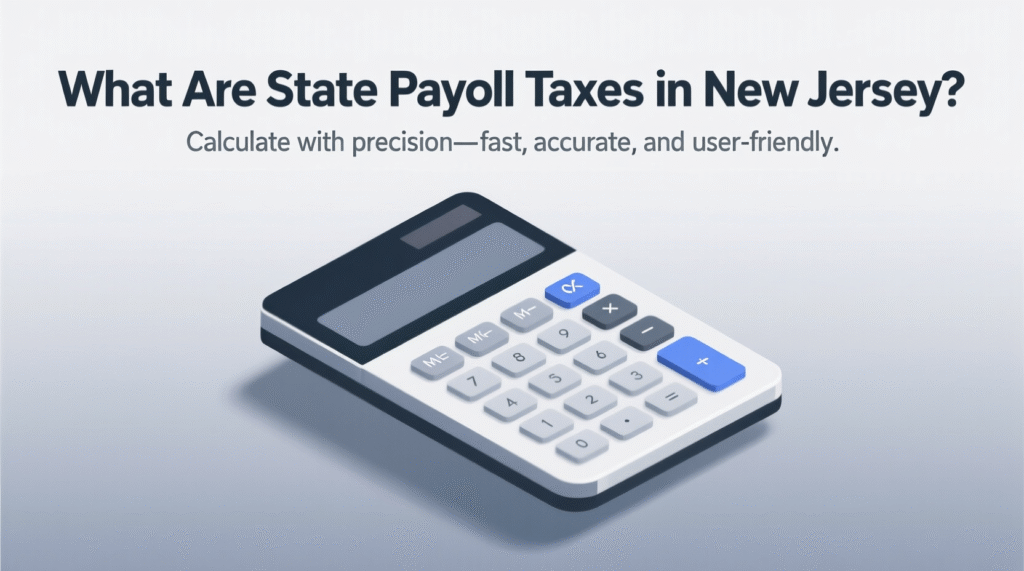
If you run payroll in New Jersey—or you’re an employee trying to figure out why so much comes out of your paycheck—you’ve probably asked: “What exactly are state payroll taxes in New Jersey?”
The short answer: New Jersey payroll taxes are a mix of state income tax withholding and mandatory contributions to unemployment, disability, and family leave programs. Some of these are paid by employees, some by employers, and all must be filed correctly with the state.
Let’s break it down clearly.
Quick Snapshot of New Jersey Payroll Taxes
In 2025, New Jersey payroll taxes include:
- State Income Tax (withholding): 1.4% to 10.75% depending on income.
- State Unemployment Insurance (SUI): Both employee and employer contribute, wage base capped at $43,300.
- Temporary Disability Insurance (TDI): Employee share is 0.23% of wages, capped at $380.42 annually.
- Family Leave Insurance (FLI): Employee share is 0.33%, capped at $545.82 annually.
- Workforce Development/Supplemental Fund: Employee share of 0.0425% on $43,300, about $18.40 annually.
- Local Payroll Taxes: Some cities like Newark and Jersey City add a 1% employer-side payroll tax.
State Income Tax Withholding
New Jersey uses a progressive tax system. Employers must withhold based on state tables, which go from 1.4% for low earners up to 10.75% for high-income employees.
👉 Example:
- An employee earning $60,000 annually will see a much lower effective rate than a high earner making $1 million.
- Employers calculate withholding using Form NJ-WT tables based on pay frequency (weekly, biweekly, monthly).
Tip for employees: If you live in Pennsylvania and work in NJ, you may be exempt from NJ withholding due to a reciprocity agreement.
State Unemployment Insurance (SUI)
Unemployment taxes fund state benefits when workers lose jobs.
- Employees contribute 0.3825% of wages up to $43,300.
- Employers contribute at a rate that varies by experience (from 0.6% to 6.4%). New employers usually start at 3.1%.
This is one of the larger payroll costs for small businesses.
Temporary Disability Insurance (TDI)
TDI covers workers who can’t work due to non-work-related illness or injury.
- In 2025, employees pay 0.23% of wages up to $165,400, with a yearly maximum of $380.42.
- Employers may also provide coverage, but the state sets the contribution rate.
Family Leave Insurance (FLI)
Family Leave Insurance helps employees take paid time off to care for family members or bond with a new child.
- Employees contribute 0.33% of wages up to $165,400.
- Maximum contribution is about $545.82 per year.
Workforce Development & Supplemental Fund
A smaller but mandatory contribution:
- Employees pay 0.0425% on wages up to $43,300.
- That works out to less than $20 per year, but it must still be deducted and reported.
Local Payroll Taxes
While most of NJ has no local payroll tax, two major cities do:
- Newark: Employers must pay a 1% payroll tax on wages of employees working in the city.
- Jersey City: Similar 1% employer payroll tax, with certain exemptions (such as for residents).
This doesn’t reduce employee pay but does increase employer costs.
Employer vs. Employee Contributions
Here’s a side-by-side summary of who pays what:
| Tax Type | Employee Share | Employer Share | 2025 Wage Base |
|---|---|---|---|
| State Income Tax (withholding) | 1.4%–10.75% | — | None |
| State Unemployment Insurance | 0.3825% | 0.6%–6.4% | $43,300 |
| Temporary Disability Insurance | 0.23% | May apply | $165,400 |
| Family Leave Insurance | 0.33% | — | $165,400 |
| Workforce Development Fund | 0.0425% | — | $43,300 |
| Local Payroll Taxes (Newark/Jersey City) | — | 1% of payroll | — |
Filing & Compliance
Employers must:
- Register with the NJ Division of Revenue and Enterprise Services.
- Withhold and remit taxes using the state’s electronic filing system.
- File quarterly reports (Form NJ-927) and annual reconciliations (W-2s, NJ-W-3).
Missing deadlines can trigger penalties, so automation or payroll software can help.
Example Payroll Calculation
Let’s say you earn $1,500 weekly in New Jersey. Here’s how state payroll taxes might look:
- State Income Tax (withholding): ~$50 (varies by bracket)
- SUI: $5.74
- TDI: $3.45
- FLI: $4.95
- Workforce Development: $0.64
👉 Net impact: About $65–70 in state payroll taxes per week, plus federal deductions.
FAQs About NJ Payroll Taxes
1. What is the NJ payroll tax rate for employees?
Employees contribute to state income tax, SUI (0.3825%), TDI (0.23%), FLI (0.33%), and Workforce Development (0.0425%).
2. How much do employers pay?
Employers pay unemployment insurance (0.6%–6.4%) and any applicable local payroll taxes (1% in Newark/Jersey City).
3. Are Pennsylvania residents exempt?
Yes, they file a certificate of non-residency and pay PA taxes instead.
4. What is the SUI wage base in 2025?
$43,300.
5. Do local taxes affect employees?
No, Newark and Jersey City payroll taxes are employer-only.
Robert is the creator of StateTaxesEstimator.com, a trusted resource dedicated to helping users accurately estimate their state taxes. With a strong focus on clarity and precision, Robert combines expert knowledge with practical tools to simplify complex tax calculations. His mission is to empower individuals and businesses to make informed financial decisions with confidence and ease.
